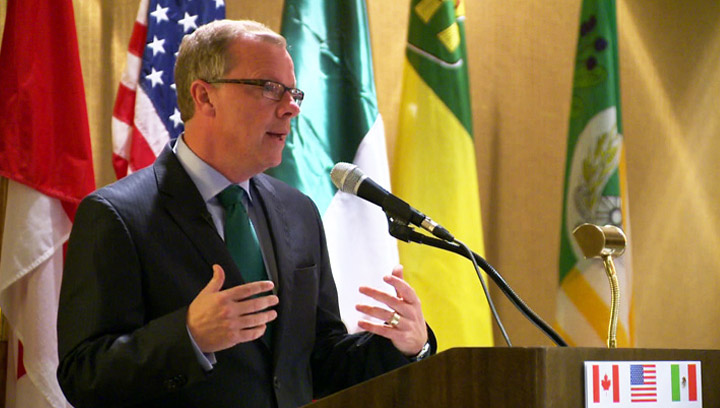REGINA – Slumping demand for the pink mineral potash dimmed Saskatchewan’s economic glow at the end of this year.

But Premier Brad Wall says the outlook is positive for the year ahead, despite pressures in the potash industry and a report that Saskatchewan’s boom could be cooling.
“We have to take a look at the whole economy,” Wall said in a year-end interview with The Canadian Press.
“Our economy is diversified. We’re more than just one sector. We have a lot of … cylinders that are firing in this economic engine … so when the natural resource sector is down, we’re still creating net thousands of jobs year over year.”
Saskatchewan’s economy took off in 2007, based largely on revenue from natural resources, such as oil and gas and potash, which is used in fertilizer.
But potash and the companies that produce it were hit hard this year when Russian-based Uralkali, one of the world’s largest potash producers, quit an export partnership. China and India, key markets for fertilizer, then delayed purchases in expectation of lower prices. That sent shipments plunging.
Saskatchewan, with almost half of the global potash reserves, felt the impact.
The province said in its mid-year financial update in November that potash revenue was projected to drop by $107.2 million from the budget estimate.
In early December, Saskatoon-based Potash Corp. (TSX:POT) announced plans to reduce its workforce by almost 20 per cent, laying off 1,045 people. The biggest cuts were in Saskatchewan, where 440 people lost their jobs. One of two mills in the town of Lanigan, east of Saskatoon, is to suspend production by the end of the year.

Get weekly money news
The Conference Board of Canada said in its outlook for 2014 that “a cooling is anticipated for the booming Saskatchewan economy.”
“The province will face some headwinds, including weaker prospects for the potash and mineral fuels industries,” said the outlook released Dec. 9.
The board is forecasting real GDP growth of 2.3 per cent in 2014 – down from four per cent this year. But Marie-Christine Bernard, who works on provincial forecasts for the conference board, says it’s not a negative picture.
“I wouldn’t say the boom is finished,” said Bernard.
“I think … the economy remains very dynamic, but you won’t see it in bottom-line growth, you won’t see it in real GDP growth because of PotashCorp’s production cuts.
“But the other sectors of the economy are still moving very well. You have a very tight labour market in Saskatchewan. Wage pressures, we are seeing, are building so that means the people that are employed are having strong income growth. People are also spending, so it’s very positive for the retail sales industry.”
For example, wholesale trade in Saskatchewan hit a record $2 billion in October and manufacturing sales totalled $1.35 billion, also a record for October, according to Statistics Canada.
The agency also said employment in Saskatchewan in November was up by 12,300 compared with November 2012. Saskatchewan’s unemployment rate was 4.1 per cent – the lowest in Canada for the 11th consecutive month.
It was also a bumper year for agriculture in 2013.
Saskatchewan had a record crop, roughly 34.2 million tonnes, which pushed the real GDP a full percentage point higher to 3.6 per cent from the forecasted 2.6 per cent.
Wall calls it “strong, steady growth.” He said he doesn’t want to use the word “boom.”
“In my view, from an economic standpoint, it’s hard to say that we’ve had a boom. We had a year not very long ago, just in 2009, where we had actually zero GDP. We were technically in recession … because of the heavy weight of potash on the GDP,” the premier pointed out.
“When you look at our gross domestic product numbers, you’ll see sustainable growth between two and 3.5 per cent _ not fives and sixes or sevens like you think of in a boom and so people should be heartened by this.
“Bottom line is the lowest unemployment rate in the country going forward, it looks like. The bottom line is opportunities here, huge plans for capital investment from all the sectors … so it’s not such a bad thing to see a change as long as we’re still growing, as long as we’re adding jobs and we’re welcoming new people.”







Comments